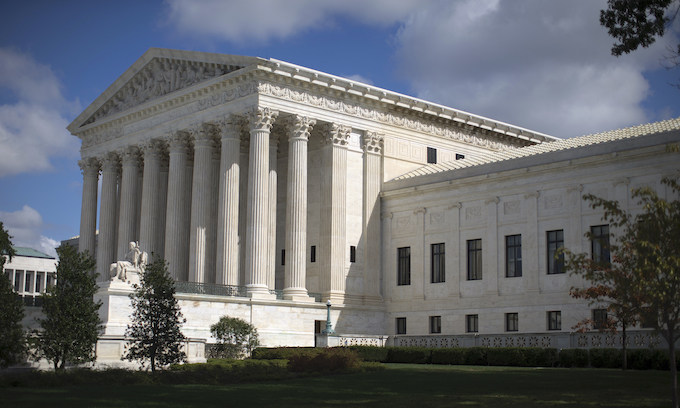The Supreme Court said Monday it won’t hear an appeal challenging the federal ban on bump stocks, which allow a shooter to fire continuously with a single pull of trigger, implemented after the Las Vegas shooting.
The high court’s decision to not hear the appeal leaves the ban on bump stocks in place.
Bump stocks increase a semiautomatic weapon’s rate of fire to nearly that of a fully automatic machine gun. Some guns can fire over 400 rounds per minute with a bump stock. The U.S. Department of Justice began to review the legality of bump stocks in December of 2017 after Stephen Paddock, 64, used bump stocks to convert some of his guns to fire at higher rates in the Oct. 1, 2017, shooting at a Las Vegas music festival that killed 58 people and injured hundreds more.
President Donald Trump signed a directive to ban the devices in early 2018 following the review. The Bureau of Alcohol, Tobacco, Firearms, and Explosives announced in December 2018 it would expand the definition of “machine gun” under the National Firearms Act to include bump stocks, which it previously said for years were legal. And the federal ban went into effect in March 2019 amid a gun rights group appeal to the Supreme Court to overturn the ban. The ban means it’s illegal to own, buy or sell a bump stock and gun owners must destroy the devices or turn them in to authorities.
The lower courts declined to block the Trump administration ban from going into effect. A lower court also applied the Chevron principle from the 1984 case, Chevron v. Natural Resources Defense Council, requiring federal courts to defer to an agency’s reasonable interpretation of an ambiguous statute Congress passes, to uphold the ban.
Justice Neil Gorsuch, a Trump appointee, agreed the case does not merit review, but criticized the lower court for applying Chevron to the case in a statement accompanying the Supreme Court’s decision not to hear the case.
“The agency used to tell everyone that bump stocks don’t qualify as ‘machine guns.’ Now it says the opposite,” Gorsuch wrote. “The law hasn’t changed, only an agency’s interpretation of it. And these days it sometimes seems agencies change their statutory interpretations almost as often as elections change administrations.”
He added “ordinary citizens” are “forced to guess” what an agency will consider a “reasonable” interpretation of laws passed by Congress, and asked why the courts should defer “to such bureaucratic pirouetting.”
Copyright 2020 United Press International, Inc. (UPI). Any reproduction, republication, redistribution and/or modification of any UPI content is expressly prohibited without UPI’s prior written consent.
—-
This content is published through a licensing agreement with Acquire Media using its NewsEdge technology.



















Recent Comments